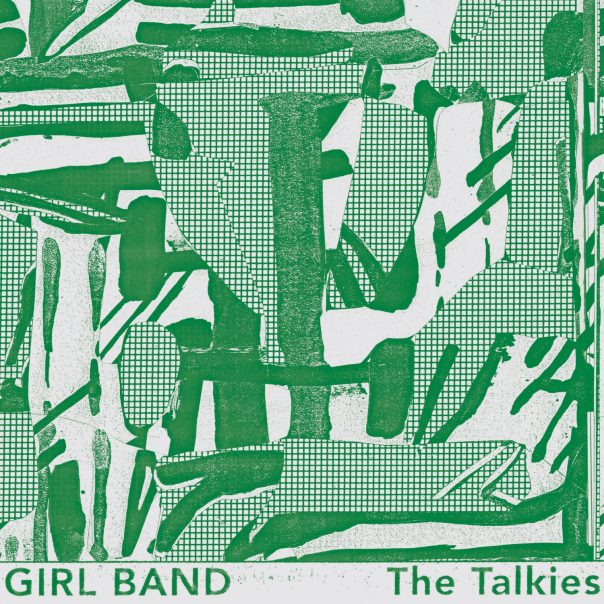ALBUM REVIEW: Girl Band tours a house of noise rock horror on ‘The Talkies’

Post-punk has a darker side that many choose to overlook. While revivalists like The Killers and The National scrape the tip of the iceberg, plunging into the turbulent depths reveals the likes of Ireland’s Girl Band. Like Killing Joke and The Pop Group, these guys throws punk rock’s ugliest features into a cesspool of freakish no-wave and harsh noise rock.
The Talkies
Girl Band
Rough Trade, Sept. 27
At the center of the band are the hellish, animalistic vocals of Dara Kiely, who sounds like the deranged offspring of Michael Gira and Yoko Ono. Things remain as anti-musical as you’d expect on the band’s sophomore effort, The Talkies, but a tangible atmosphere within the sonic fray remains. The atmosphere, according to guitarist Alan Duggan, aims to give a vivid portrayal of what it was like to record the album at Ballintubbert House in Dublin.
The hushed, droning pulse of opener “Prolix” is driven almost entirely by Kiely’s heavy breathing, generating a visceral feeling of isolation and paranoia. Girl Band trades in unnerving sonics, but it doesn’t take long for “Going Norway” to break the tension like a construction zone run amuck. Adam Faulker’s trashy beat blunders ahead as Duggan and bassist Daniel Fox approach their mutated anti-riffs like Frankenstein building his monster. Kiely’s words rail against societal constructions, as his delivery makes him sound like a demented prophet lurching around the streets of Oslo.
Traditional songwriting is almost nonexistent on The Talkies, but Girl Band elaborates on its atonal motifs with surprising strategy. Based around harrowing walls of grating tremolo-picked guitars, “Shoulderblades” finds a rhythmic foothold on Faulker’s bouncy shuffle.
It’s almost appropriate for Kiely’s work to read like an inane diatribe. Sometimes, it really does amount to beastial hollering, but his frenetic poetry does spotlight some clever references—like the urban legend of two-faced nobleman Ed Mordake. His motif, “Like a hat for Ed Mordake,” could be taken as a metaphor for how people use vices, materialism and isolation to hide their insecurities.
The setting of the album materializes on “Salmon of Knowledge,” where it almost sounds like the instruments are being recorded at the same time in different rooms. Fox’s low-end drone envelops Faulker’s muted drum clicks, but the guitars and bass provide jarring changes in a blink of an eye.
Following the rising action of Kiely’s voice, the band’s industrial-tinged grooves prove to be as hypnotic as they are aversive. Though most of “Couch Combover” really centers on one note, it’s that simplistic foundation that sets up the spine-tingling soundscapes to go any which way. By the halfway point, the band has opened up a portal to hell, and Kiely commands the demons with terrifying agony.
It’s very easy for music like this to overstay its welcome, so shorter tracks become vital to maintaining the album’s momentum and diversity. “Akineton” divulges into pure harsh noise while the following “Amygdala” centers on a percussive guitar loop and what sounds like Kiely furiously trying to hack up a hairball.
Where “Aibohphobia” contrasts a roomy ambiance with ocellated noise-mongering, “Caveat” inexplicably remains danceable within its lurching dynamics and gurgling tumult. Keily rarely sings—or completes a sentences for that matter—but his eccentric braying imparts direction to these exercises of insanity.
For the more long-winded cuts, Girl Band handles every sound with care. What elevates the siren-like guitar scoops of “Laggard” above meaninglessness is the way the primitive foundation constantly changes and develops. The effect is similar to Swans and Daughters, creating an indestructible house of horrors.
In the case of “Prefab Castle,” bass and guitar go in an entirely textural direction. Without a pulsing bass drum and clattering cymbals to hold it together, it’s likely to appeal most to fans of Merzbow. It would be awesome in that regard alone, but the amorphous drones and hair-raising dissonance mixed into the primitive groove yield an experience as infectious as it is filthy.
Girl Band may actually be closer to the likes of Throbbing Gristle than Joy Division, in that it rejects all semblance of conventional music.It’s still post-punk; however, going beyond the preconceived ideas of what punk can be. It has little use for the depressive sobriety often associated with pioneers like Joy Division, carving out its niche in the genre’s underworld.
Listening to The Talkies compares to watching a great suspense film. You’re tense, but you don’t want to relax.
Follow editor Max Heilman at Twitter.com/madmaxx1995 and Instagram.com/maxlikessound.
